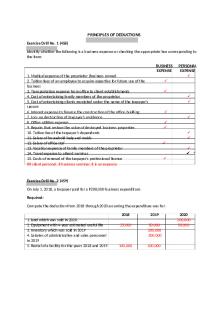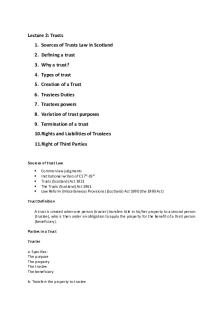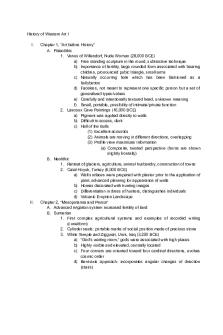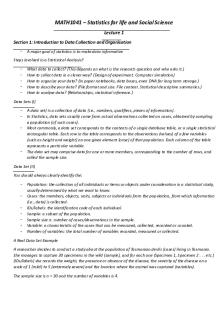Chapter-13- Notes PDF

| Title | Chapter-13- Notes |
|---|---|
| Author | Sherlyne Anne Bureres |
| Course | Applied Psychology |
| Institution | University of the Philippines System |
| Pages | 7 |
| File Size | 146.7 KB |
| File Type | |
| Total Downloads | 66 |
| Total Views | 169 |
Summary
General psychology notes...
Description
CHAPTER 13
-
THEORIES OF PERSONALITY
*personality -
the unique and relatively stable ways in which people think, feel, and behave.
*character -
-
***Reality Principle -
value judgments of a person’s moral and ethical behavior.
*Temperament -
the biologically innate and enduring characteristics with which each person is born, such as irritability or adaptability
no single explanation of personality exists is because personality is still difficult to measure precisely and scientifically, and different perspectives of personality have arisen.
** preconscious
**Superego -
-
-
-
level of the mind in which thoughts, feelings, memories, and other information are kept that are not easily or voluntarily brought into consciousness. most important determining factor in human behavior and personality
-
* Freud’s divisions of the personality **id
-
-
id makes demands, the superego puts restrictions on how those demands can be met, and the ego has to come up with a plan that will quiet the id but satisfy the superego Sometimes the id or the superego does not get its way, resulting in a great deal of anxiety for the ego itself. This constant state of conflict is Freud’s view of how personality works; it is only when the anxiety created by this conflict gets out of hand that disordered behavior arises.
** Psychological Defense part of the personality present at birth and completely unconscious. Id is a Latin word that means “it.” pleasure-seeking, amoral part of the personality containing all of the basic biological drives IF IT FEELS GOOD, DO IT
***Pleasure Principle -
part of the superego that produces guilt, depending on how acceptable behavior is. Moral anxiety sense of right and wrong
* How the Three Parts of the Personality Work Together
** Unconscious Mind
-
part of the personality that acts as a moral center. THE MORAL WATCHDOG
***Conscience
**conscious
-
principle by which the ego functions; the satisfaction of the demands of the id only when negative consequences will not result.
Freud’s conception of Personality
*The Structure of the Mind
-
part of the personality that develops out of a need to deal with reality; mostly conscious, rational, and logical. from the Latin word for “I,” THE EXECUTIVE DIRECTOR “if it feels good, do it, but only if you can get away with it.”
principle by which the id functions; the desire for the immediate satisfaction of needs without regard for the consequences.
-
mechanisms unconscious distortions of a person’s perception of reality that reduce stress and anxiety.
Ego
-
child who rebels openly will refuse to go in the toilet someone who sees messiness as a statement of personal control and who is somewhat destructive and hostile
***Anal Retentive Personality -
-
children terrified of making a mess and rebel passively—refusing to go at all or retaining the feces. No mess, no punishment. As adults, they are stingy, stubborn, and excessively neat.
**Phallic Stage (3 to 6 years) -
Stages of Personality
-
*Psychosexual Stages -
five stages of personality development proposed by Freud and tied to the sexual development of the child.
**erogenous zone -
area of the body that produces pleasurable feelings, becomes important and can become the source of conflicts.
***castration anxiety -
-
the first stage in Freud’s psychosexual stages, occurring in the first 18 months of life in which the mouth is the erogenous zone and weaning is the primary conflict. Weaning that occurs too soon or too late can result in too little or too much satisfaction of the child’s oral needs, resulting in orally fixated adult personality: overeating, drinking too much, chain smoking, talking too much, nail biting, gum chewing, and a tendency to be either too dependent and optimistic (when the oral needs are overindulged) or too aggressive and pessimistic (when the oral needs are denied)
**Anal Stage (18 To 36 Months) -
the second stage in Freud’s psychosexual stages, occurring from about 18 to 36 months of age, in which the anus is the erogenous zone and toilet training is the source of conflict.
***Anal Expulsive Personality
when boys realized that the little girl down the street had no penis, they developed a fear of losing the penis
***penis envy -
** Oral Stage (First 18 Months) -
the third stage in Freud’s psychosexual stages, occurring from about 3 to 6 years of age, in which the child discovers sexual feelings. phallic comes from the Greek word phallos and means “penis.”
developed in girls because they were missing a penis
*** Oedipus complex/Electra complex -
-
situation occurring in the phallic stage in which a child develops a sexual attraction to the opposite-sex parent and jealousy of the same-sex parent. Males develop an Oedipus complex whereas females develop an Electra complex. Child tries to be just like his parent in every way, taking on the parent’s behavior, mannerisms, values, and moral beliefs as his own, so that Dad or mom won’t be able to get angry. The result of identification is the development of the superego, the internalized moral values of the samesex parent.
Fixation in the phallic stage usually involves immature sexual attitudes as an adult. People who are fixated in this stage, according to Freud, will often exhibit promiscuous* sexual behavior and be very vain. The vanity is seen as a cover-up for feelings of low self-worth arising from the failure to resolve the complex, and the lack of moral sexual behavior stems from the failure of identification and the inadequate
formation of the superego. Additionally, men
with this fixation may be “mama’s boys” who never quite grow up, and women with this fixation may look for much older father figures to marry.
-
**Latency Stage (6 Years To Puberty) -
-
the fourth stage in Freud’s psychosexual stages, occurring during the school years, in which the sexual feelings of the child are repressed while the child develops in other ways. children grow and develop intellectually, physically, and socially but not sexually. This is the age at which boys play only with boys, girls play only with girls, and each thinks the opposite sex is pretty awful.
**Archetypes -
-
the final stage in Freud’s psychosexual stages; from puberty on, sexual urges are allowed back into consciousness and the individual moves toward adult social and sexual behavior. entry into adult social and sexual behavior.
*Fixation -
disorder in which the person does not fully resolve the conflict in a particular psychosexual stage, resulting in personality traits and behavior associated with that earlier stage.
Jung’s collective, memories.*
universal
human
***anima/animus -
the feminine side of a masculine side of a woman
man/the
***shadow -
**Genital Stage (Puberty On) -
Jung’s name for the memories shared by all members of the human species. contains a kind of “species” memory, memories of ancient fears and themes that seem to occur in many folktales and cultures
the dark side of personality, called the “devil” in Western culture
***persona -
The side of one’s personality that is shown to the world
* Alfred Adler -
-
-
in disagreement with Freud over the importance of sexuality in personality development. The driving force behind all human endeavors, emotions, and thoughts for Adler was not the seeking of pleasure but the seeking of superiority birth order of a child affected personality
**Compensation
The Neo-Freudians
-
*Psychoanalysis -
an insight therapy based on the theory of Freud, emphasizing the revealing of unconscious conflicts; Freud’s term for both the theory of personality and the therapy based on it.
*Karen Horney -
*Neo-Freudians -
followers of Freud who developed their own competing psychodynamic theories.
*Carl Gustav Jung -
disagreed with Freud about the nature of the unconscious mind believed that the unconscious held much more than personal fears, urges, and memories.
**Personal Unconscious -
Jung’s name for the unconscious mind as described by Freud.
**Collective Unconscious
people try to overcome feelings of inferiority in one area of life by striving to be superior in another area
-
disagreed with Freudian views about the differences between males and females and most notably with the concept of penis envy “womb envy,” stating that men felt the need to compensate for their lack of child-bearing ability by striving for success in other areas
**Basic Anxiety -
anxiety created when a child is born into the bigger and more powerful world of older children and adults.
**Neurotic Personalities -
-
personalities typified by maladaptive ways of dealing with relationships in Horney’s theory. deal with their anxiety by moving toward people, becoming dependent
and clingy
-
move against people, becoming aggressive, demanding, and cruel. move away from people by withdrawing from personal relationships.
*Rotter’s Social Expectancies -
*Erik Erikson -
-
broke away from Freud’s emphasis on sex, preferring instead to emphasize the social relationships that are important at every stage of life. eight psychosocial stages
Current Thoughts on Freud and the Psychodynamic Perspective
despite several criticisms, Freud’s theory still important—first to suggest that personality develops through stages, that we are not always consciously aware of reasons for behavior, and that early life experiences influence who we are later in life
-
Learning Theories
-
in behaviorism, sets of well-learned responses that have become automatic.
-
theorists who emphasize the importance of both the influences of other people’s behavior and of a person’s own expectancies on learning.
*Social Cognitive View -
learning theory that includes cognitive processes such as anticipating, judging, memory, and imitation of models.
*Bandura’s Reciprocal Determinism And Self-Efficacy **Reciprocal Determinism -
Bandura’s explanation of how the factors of environment, personal characteristics, and behavior can interact to determine future behavior.
devised a theory based on a basic principle of motivation derived from Thorndike’s law of effect: People are motivated to seek reinforcement and avoid punishment. viewed personality as a relatively stable set of potential responses to various situations. If in the past a certain way of responding led to a reinforcing or pleasurable consequence, that way of responding would become a pattern of responding, or part of the “personality” two key factors influencing a person’s decision to act in a certain way given a particular situation
a person’s subjective feeling that a particular behavior will lead to a reinforcing consequence.
**Reinforcement value -
refers to an individual’s preference for a particular reinforcer over all other possible reinforcing consequences.
**Locus Of Control -
*Social Cognitive Learning Theorists -
Theory:
**Expectancy
*Habits -
Learning
the tendency for people to assume that they either have control or do not have control over events and consequences in their lives
.
Unlike psychoanalysis, the concepts in this theory can and have been tested under scientific conditions Some of this research has investigated how people’s expectancies can influence their control of their own negative moods. Although some critics think that human personality and behavior are too complex to explain as the result of cognitions and external stimuli interacting, others point out that this viewpoint has enabled the development of therapies based on learning theory that have become effective in changing undesirable behavior.
** Self-efficacy -
individual’s expectancy of how effective his or her efforts to accomplish a goal will be in any particular circumstance.
Carl Rogers and the Humanistic Perspective
*Humanistic Perspective...
Similar Free PDFs
Popular Institutions
- Tinajero National High School - Annex
- Politeknik Caltex Riau
- Yokohama City University
- SGT University
- University of Al-Qadisiyah
- Divine Word College of Vigan
- Techniek College Rotterdam
- Universidade de Santiago
- Universiti Teknologi MARA Cawangan Johor Kampus Pasir Gudang
- Poltekkes Kemenkes Yogyakarta
- Baguio City National High School
- Colegio san marcos
- preparatoria uno
- Centro de Bachillerato Tecnológico Industrial y de Servicios No. 107
- Dalian Maritime University
- Quang Trung Secondary School
- Colegio Tecnológico en Informática
- Corporación Regional de Educación Superior
- Grupo CEDVA
- Dar Al Uloom University
- Centro de Estudios Preuniversitarios de la Universidad Nacional de Ingeniería
- 上智大学
- Aakash International School, Nuna Majara
- San Felipe Neri Catholic School
- Kang Chiao International School - New Taipei City
- Misamis Occidental National High School
- Institución Educativa Escuela Normal Juan Ladrilleros
- Kolehiyo ng Pantukan
- Batanes State College
- Instituto Continental
- Sekolah Menengah Kejuruan Kesehatan Kaltara (Tarakan)
- Colegio de La Inmaculada Concepcion - Cebu















